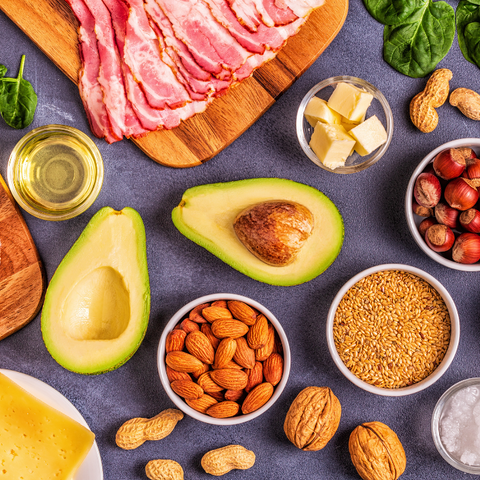Most people have heard of the keto diet, but just in case you haven't, the Keto diet is a popular diet that promises to help you achieve weight loss in a short amount of time. But, does it really work? Does it help you achieve this? And is there any real evidence behind this? In this article, we'll answer your questions about why the keto diet works and some tips on how to optimise it to make it work better for you. Ready? Let's dive in.
How does the keto diet work?
The keto diet is a low-carb, high-fat eating plan that puts your body in a state of ketosis. This process helps you lose weight quickly and efficiently without feeling deprived or hungry. Studies have shown that the keto diet can reduce inflammation in the body, and lower blood pressure while reducing body fat.
Ketosis: it's a natural metabolic process where your body burns fats for energy instead of carbohydrates. When you restrict your carb intake to 20-50 grams per day and increase your fat intake, your liver begins producing ketone bodies which act as an alternative fuel source. As your body adjusts to this new fuel source, it starts burning stored body fat instead of the carbs you eat.
Is the Keto Diet Safe?
Although the keto diet aids in weight loss, it comes with challenges of its own such as low blood sugar levels, high cholesterol levels and nutrient deficiencies. To minimise the negative effects, it's advised to try to eat balanced meals with whole foods to get essential vitamins and minerals. But, more importantly, it's also advisable to speak to your doctor just to make sure the keto diet is safe for you.
The Keto Diet: Drawbacks and Criticisms
The keto diet's main challenge is its limited nature, making it challenging to maintain over an extended period. A significant reduction in carbohydrates means that people have to cut out favourite snacks, cakes, and beverages, which can lead to over-restriction and, in some cases, nutrient deficiencies or binge eating, causing the diet to fail. Moreover, experts suggest that since keto diets rely heavily on animal products such as meat, fish, and eggs, they may not be suitable for everyone based on dietary preferences or restrictions. The high-fat content in the keto diet is also a concern for some critics, as consuming too much saturated fat could have potential health risks.
Here at No Guilt Bakes, we focus on making keto-friendly and low-carb snacks, cakes and treats so you don't have to feel like you're on a restrictive diet while following a keto lifestyle. Check out all our products.
How A Ketogenic Diet Works
In order for the body to enter ketosis, it needs to be deprived of glucose which the body typically gets from carbohydrate intake. What this means is that, on a keto diet, you'll need to reduce your daily carbohydrate intake significantly and replace them with other macronutrients like healthy fats. Once in the state of ketosis, your body will start to break down fatty acids into molecules called ketones which can then be used as an energy source instead of glucose.
Other Considerations of a Ketogenic Diet
May reduce hunger
One of the best things about the keto diet is that it can help you feel less hungry. Basically, ketosis makes your body produce fewer ghrelin hormones that make you feel hungry. This means that you might feel fuller for longer periods of time and end up eating less food overall. Plus, consuming healthy fats can give you more sustained energy throughout the day, so you won't have to rely on sugary snacks to stay awake. This can help you stick to your diet and avoid cravings for unhealthy treats. Ultimately, curbing your appetite can be a game-changer when it comes to reaching your weight loss goals while still enjoying yummy meals.
Calorie balance
Understanding calorie balance is important when trying to achieve and maintain your desired weight. It refers to the middle ground between calories taken in and calories burnt by the body through physical activity and other day-to-day activities. [1]
Maintaining a calorie balance will ensure that your weight remains stable. To achieve a calorie deficit, which means consuming fewer calories than your body needs, you must reduce your calorie intake by eating fewer calories or increasing your physical activity. This also works the other way, where if you have a calorie surplus, you'll gain weight over time.
Your exact carb intake
When it comes to your exact carb intake on a keto diet, it’s important to keep track of how many carbs you are consuming each day. It’s recommended that most people consume less than 50 grams of carbohydrates per day in order to enter ketosis and reap the potential benefits of the diet, such as weight loss. You can do this by carefully tracking what foods you eat and how much of them you are having each day. This means taking the time to measure out portions, read food labels, and be mindful of hidden carbs in condiments or sauces. It might seem like a lot of work at first, but once you get into a routine it will become more natural over time. And if you need help figuring out your carb intake, you can always consult with a nutritionist or doctor who can provide tailored advice based on your goals and lifestyle.
Whether you're getting enough sleep
Getting enough sleep is super important, even when you're on the keto diet. Studies show that if you're not getting enough rest or you're constantly stressed, it could mess with your weight loss goals. So, to get the most out of the keto diet, you should aim for at least 7 hours of sleep every night. Not getting enough sleep can also make you hungrier by messing with hormones like ghrelin and leptin, which could work against the hunger-reducing benefits of the keto diet. To make sure you're getting enough rest, try sticking to a regular sleeping schedule and do some relaxing activities before bed, like reading, journaling, or stretching. This will help your body recognize when it's time to wind down and improve your overall wellbeing too!
Whether you're physically active
If you're thinking about trying out the keto diet, don't forget to get moving too! Research shows that combining the keto diet with moderate exercise can really boost its positive effects. When you're in ketosis, your body can use fat as its main source of energy during exercise, which can be especially helpful for endurance sports. Plus, regular physical activity can help you lose weight by burning extra calories and improving your mental health. So, if you want to get the most out of the keto diet, try incorporating some kind of exercise into your routine, like jogging, biking, or swimming. This will help you see the best possible results with your ketogenic lifestyle!
Sustainability of the diet
When it comes to the keto diet, sustainability is an important factor to keep in mind. While the diet may offer benefits, it can be difficult to stick to over time due to its restrictive nature. This means that social events or eating out with friends and family may pose a challenge. It's important to create a plan that works for you and your individual circumstances, setting achievable goals and taking small steps towards sustainable changes. Additionally, incorporating moderate physical activity into your routine can help support long-term sustainability. Exercise can help burn calories, reduce stress and improve mental health, which are all important for achieving the best results on the keto diet.
Potential Pitfalls
The keto diet has become increasingly popular, but there are potential drawbacks to keep in mind. To start, the diet requires a significant reduction in carbs and an increased intake of fat, which can lead to an adjustment period with withdrawal symptoms such as headaches, brain fog, or irritability. Also, since the diet excludes certain food groups, it's important to be creative and ensure adequate intakes of fiber, B vitamins, and minerals. Constipation is also a common issue due to the high-fat intake, so including more soluble fiber from sources like nuts and seeds can help. Finally, the restrictive nature of the diet can make it challenging to maintain in the long run, so setting realistic goals and taking small steps can help create sustainable changes that will last.
Is the Keto diet for me?
Well, it's hard to say. Like with any dietary change, it's crucial to take into account your overall health and lifestyle before making such a significant shift. If you have any underlying medical conditions, it's essential to consult with your doctor before starting the diet to ensure it's safe and suitable for you. Additionally, the restrictive nature of the keto diet may not be sustainable for everyone in the long run. If you're worried about this, it's a good idea to talk to your doctor or a registered dietitian about alternative options that may be more suitable for your individual needs.
5 Tips for Getting the Most Out of Your Keto Diet
-
Don't skimp on the fat – It's the backbone of your keto diet, so make sure you're getting enough of it. Nuts, seeds, avocados, coconut oil, and olive oil are all great sources of fat.
-
Load up on protein – Keep your muscles strong by eating plenty of protein. Think lean meats like chicken and fish, as well as eggs and dairy products like cottage cheese and Greek yoghurt.
-
Be mindful of carbs – You don't want to overdo it on the carbs, but you also don't want to cut them out entirely. Stick to non-starchy leafy greens like spinach, kale, and broccoli, and treat yourself to some avocado and berries in moderation.
-
Stay hydrated – Drinking plenty of water is crucial to the keto diet. And if you want to go the extra mile, add some magnesium or potassium supplements to help keep you hydrated.
-
Get your beauty sleep – Sleep is important for both your physical and mental well-being, so make sure you're getting at least seven hours a night while you're on the keto diet. Your body will thank you!
References:




Comments (0)
There are no comments for this article. Be the first one to leave a message!